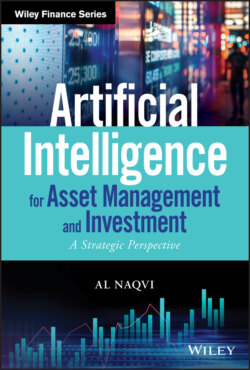Читать книгу Artificial Intelligence for Asset Management and Investment - Al Naqvi - Страница 35
INTELLIGENCE AND ACTIONS
ОглавлениеFor business purposes, I define intelligence as being able to successfully perform work by displaying goal-directed behavior in situations of uncertainty. When machines display intelligence, they perform work and resolve uncertainty in accordance with goal-directed behavior. It can also be viewed as an attribute of an artifact by which it accomplishes work by successfully tackling uncertain situations in accordance with its goals.
Let us clarify this definition:
Being able to successfully perform work: This implies that the entity or artifact can perform work, and its success is determined in accordance with the goal set for the entity. Work implies the activities conducted by humans that add value for human life and survival.
Goal-directed behavior: Goal-directed behavior implies that the entity is operating with a sense of purpose and not just randomly. It has a goal. This goal may have been given by a human or it may have assigned the goal to itself.
Uncertainty: Uncertainty implies the ability to navigate through situations where more than one choice exists. Of course, the greater the uncertainty, the more intelligence is needed to navigate. In a simple system, intelligent decision could be as simple as making a binary choice between two options. For example, a simple regulator can start the air conditioning or not. In a more complicated system, more choices are available. For example, in a game of chess, depending on the position, a certain number of moves are possible. Another example will be of your spellchecker or text recommender to fill in words as you type. In even more uncertain situations, for example, autonomous cars navigating and driving on a busy street, the number of choices is unimaginably large.
But performing or accomplishing work requires more than intelligence. It requires us to take actions.
